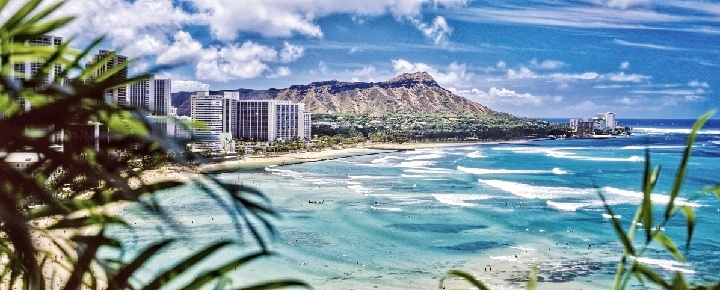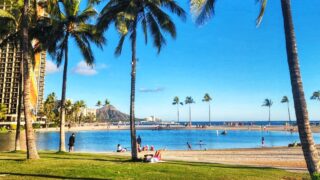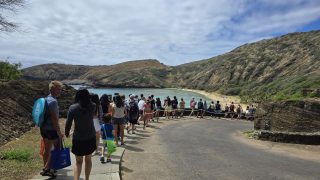Starting January 1, 2026, the cost of staying in Hawaii will increase. A new law passed by the legislature and to be signed by Hawaii’s governor increases the state’s hotel tax—officially the Transient Accommodations Tax—and channels that additional revenue into a dedicated climate and environmental fund. Lawmakers call it a “green fee,” but it will show up as another hike in lodging costs for travelers, including Hawaii residents.
This isn’t a separate fee visitors pay at a park entrance or online. It’s built into the price of every hotel room, vacation rental, and other paid accommodations statewide. Even Hawaii cruises. And while the increase may seem small, it marks a significant shift in how Hawaii plans to fund environmental protection. Here’s what travelers need to know about the new charge, what it will support, and why this may only be the beginning.
Hawaii’s new green fee won’t be the last charge travelers face.
Hawaii’s so-called “green fee” is not a standalone charge or a park entry fee as had once been envisioned, but simply a hotel tax increase. Under Bill 1396, the state’s Transient Accommodations Tax (TAT) will rise from 10.25% to 11% starting January 1, 2026. Combined with existing county surcharges and other fees, most visitors will pay close to 19% in taxes on hotel and vacation rental stays, up from around 18%.
Supporters have framed the move as necessary for funding climate protection and environmental resilience. The new revenue—estimated between $85 million and $100 million annually—will go to the Hawaii Climate Impact Special Fund. That fund supports wildfire prevention, invasive species control, sea-level rise adaptation, and more.
A “first step” in a larger tourism strategy.
The legislation does not authorize automatic future increases or establish additional visitor taxes. However, lawmakers and state agencies have described this as a “first step” in a larger strategy to tie tourism revenues more directly to the cost of maintaining Hawaii’s natural resources.
Additionally, the bill’s passage follows three years of intense debate and is seen as a foundational measure to fund climate resilience projects, suggesting further initiatives may follow.
Why Hawaii is pushing for tourists to shoulder the cost.
The driving force behind the green fee is local frustration, with mass tourism’s impacts and the costs of protecting fragile ecosystems. After years of mounting tension, many residents and the state government have come to believe that visitors should pay more for the burden their presence places on the islands.
Supporters of the fee, including government, environmental groups, and Native Hawaiian organizations, argue that this is about accountability. With 10 million annual visitors and increasing climate threats, they say the islands cannot afford to keep subsidizing tourism through resident taxes.
Lawmakers echoed those sentiments during debate, saying the fee creates a mechanism for visitors to give back to the places they enjoy. However, others worry that it could reinforce the growing divide between visitors and residents at a time when the state is still trying to rebuild goodwill and its tourism engine.
How rising tourism costs are changing Hawaii trips.
The green fee arrives at a time when Hawaii travel already feels more expensive than ever. Accommodations, flights, car rentals, and fees have surged in recent years, and visitors are taking notice in big ways. Reader comments on Beat of Hawaii frequently point out that what used to be a once-a-year trip now feels out of reach.
This new fee may seem modest on its own, but it joins a wave of other cost increases—including a 3% hike in hotel taxes not long ago and short-term rental concerns and restrictions. For budget-conscious travelers—and especially families—these costs add up fast and, in many cases, make a Hawaii vacation unaffordable.
Can Hawaii balance sustainability with affordability?
The core question behind the green fee and other changes is: Can Hawaii protect its environment without pricing out the people who support its fragile tourism-dependent economy?
Other iconic destinations have tried to strike that balance. Venice, for example, began charging a day fee in April 2025 that rises to €10 on weekends, targeting short-term visitors entering the historic city center in a test program. Iceland uses a tourism tax to fund environmental conservation.
Fiji adds a $100 departure tax to outbound flights, part of which supports sustainability.
But Hawaii’s challenges are different—not just because it’s a U.S. state but also because of the island chain’s cultural complexity and long-standing tensions over land, ownership, and access.
Critics of the green fee suggest that it could create an unwelcoming tone. Others argue that most visitors already contribute significantly through some of the highest lodging taxes in the country and inflated pricing across every part of the trip.
Still, supporters believe this is a step toward long-term sustainability. Hawaii’s natural beauty is its biggest draw—and without serious investment in protection, tourism itself could become unsustainable. Visitors, meanwhile, often express interest in seeing more of their spending used for visible infrastructure improvements, including parks, trails, and beaches. Whether the new climate fund supports those priorities remains to be seen.
Get ready for new rules, fees, and restrictions in Hawaii.
Visitors should prepare for more changes. In addition to the 2026 green fee, the state is actively exploring further limits on beach access, changes to trail permitting systems, and other caps, controls, and fees.
Each island is also moving at its own pace, but the direction is clear: fewer unrestricted experiences, and more systems designed to manage who goes where, and at what cost. In these ways, Hawaii certainly does not stand alone.
Is Hawaii’s paradise worth the price hikes?
For many travelers, the answer will still be an unequivocal yes. But not without hesitation. The islands remain one of the most unique and breathtaking destinations on Earth. Yet the question of value is creeping into more conversations. Is it still worth the cost, the restrictions, and what some describe as a growing friction?
There are no easy answers. What’s clear is that Hawaii is redefining the visitor experience. The green fee is both a symbolic and financial shift. Whether that move ultimately strengthens the islands—or further divides those who live there from those who visit—remains to be seen.
Are you changing your Hawaii travel plans due to rising costs or new restrictions? Would you pay more to help protect the islands? Share your thoughts in the comments—we’re listening.
Get Breaking Hawaii Travel News







Hotel fee, park fee, parking fee, fees, fees, fees. How about one for your tour operators on land or ocean. These are the businesses reaping the harm to the native environment as they take people to where they don’t belong on tours but would be free to discover for themselves. Capt. Cook didn’t have a tour guide yet he killed many 100,000 of thousands of Hawaiian species called maoli kanaka’s. 🤔
Rather than blaming the people who bring the money, look into the people who have been taking your money. Your representatives in DC, are spending your money like Maziee. Vote in someone who won’t waste your lives, heritage and money. Stop blaming the tourists.
Hi, we go Hawaii annually from Japan to visit with family from the mainland and enjoy the Island weather , sights, and culture I use to live in Kaneohe and thoroughly enjoy visiting Oahu. However the price of everything(flights, hotel, food, etc.) is making me reconsider my winter trip since Asia is more accessible and inexpensive. Since Covid the island vibe just isn’t there when I land at Daniel Inouye Airport.
Regards, Randy, Osaka, Japan
Regards
I guess it’s time to head back to the Virgin Islands.
Our timeshare in Kauai is raising the 2026 maintenance fee by 20% to pay for rising insurance costs & employee retention by increasing wages. Add the additional green fee making a 19% hotel tax , makes it unaffordable for some people. With the exchange rate at $1.40 Cdn for $1.00 U.SD these increases can make it impossible for many Canadians, who have been annual visitors to the island for many years. We now have to reconsider the cost versus value even more, adding increased car rentals, increased groceries & increased costs at restaurants, not to mention paid activities like whale tours, scuba diving , helicopter rides, just to name a few.
Many are considering other tropical locations that are more affordable.
Political incompetence and corruption
There are clear reasons why Hawaii’s economy is horrible, compared to that of other States: crazy over-regulation of everything conceivable, super-high taxation of everything under the sun, and grossly wasteful spending. Has anyone ever seen any taxes or wasteful spending in Hawaii ever decrease? Since 1982, I have not.
I usually visit the Islands 3-4 times a year. I currently have two trips planned this Fall. With the rising costs of hotel stays (with less service) And increasing taxes & fees, plus rising air fare, it’s becoming increasingly difficult. I am now Canceling one of my Fall trips and I’m re-thinking any Spring trip.
It’s a shame as Hawaii was always my go-to place for complete relaxation. Coming from the West coast, the ease of getting to the Islands always made it worth it……. Until now!
So many beautiful Caribbean islands to explore. From the west coast, I would recommend Aruba, Bonaire or Curucao. Straight shot down to South America, United Airlines thru DFW is how we went. Obviously Hawaiians feel the rest of America owes them something. We’ll be exploring the Caribbean here on out. They can have their bitterness and crappy infrastructure all to themselves!
After 50 years of almost yearly visits of 2 weeks to almost 2 months, I have never felt less welcomed. All the taxes and fees visitors pay seem to vanish into thin air, or do they go into politicians pockets? Roads that needed repaired years ago still are not touched. Hotel & resort chains continue to build mega buildings, but no seems to care. Don’t blame the visitors for everything. The lack of visitors I see this year tells me people can’t afford, or don’t feel welcome to travel here. There are many places that are more receptive to visitors. They must be going to those places. Foreign travel, especially from Japan, is nothing now. I hope the people of Hawaii realize how their government is failing them before it is too late.
Well said.
Only at 30 years of Hawaii travel, close to 100 weeks, but besides your points so well made, there is the not so subtle under-current of racism, and statements that would seem to prefer a return to the 19th Century. One Party Rule, is not working, the feeling of being owed something by Americans from other States and charging them for what the States own Government fails to deliver. No one complained before the millennia, though Japanese tourism dropped off precipitously in the mid-late ‘90’s, but that was predominantly Oahu. It was the State that didn’t follow the Surveys that would have protected west Maui, it was the Utility Companies that exacerbated the disastrous Fires of August 7, 2023, that saw but the Governor and the Maui Fire Chief out of State during the conflagration. It was a State Employee, who would not release water.
Wow, the tax and spend just gets deeper and deeper for Hawaii. The fund says that it goes toward a couple of projects, but you can bet it will also go toward high priced consultants, staffing and office space, and nothing will get done for years and years. By that time they will need to raise the taxes higher because they will have gotten so big they need more money.
Poor Hawaii, I hate to see this happen. Tourism will continue to drop because the average tourist can’t afford it, and the residents will not be able to stay because they can’t afford to live there.
You residents can stop this with who you elect… if you dare and really are tired of getting ripped of.
Before adding more fees, the state would be wise to start showing that the fees they are already charging are producing something (other than fatter pockets for politicians). Otherwise, I’ll continue to spend my discretionary dollars elsewhere. I just spent two weeks in Belize. The diving was better. The food was better. The people were friendlier. The cost was less. I will be going back next year. Hawaii—meh. The juice is no longer worth the squeeze.
Will never visit Hawaii again. Can you see me smiling?
“Fees” won’t stop us from coming … when we can. I think back over the 40-years we’ve regularly come to Hawaii twice yearly. At first we were strictly hotel people, then it got too expensive. Then we went with STR’s to save money. Then, costs (and local bad-ittude) reduced our trips from 2x year to 1x year. (The other trip we now take aboard)(Which costs us less!) We will still make the effort to come 1x year, but with the fees we will just not stay as long.